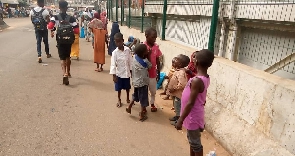 The beggars are mostly found on the streets of the Ashanti regional capital
The beggars are mostly found on the streets of the Ashanti regional capital
Hundreds of foreign and local child beggars have taken over the streets of Kumasi, the Ashanti regional capital.
The beggars are mostly found at vantage points, streets, and market areas including Kejetia, Amakom roundabout, Adum, in front of the Kumasi Zoological Garden, among others.
Aged between two to five years, the majority of these kids who are mainly from Niger chase passersby and motorists and beg them earnestly for money instead of being in schools.
Their parents are sometimes seen hanging around to take the proceeds from the begging, although the United Nations (UN) Convention on the Rights of the Child and section 87 (1-2) of the Children's Act, 1998 (Act 560) says child begging is child abuse.
In the era of Covid-19, the juvenile beggars do not wear face mask, exposing them to the coronavirus pandemic which has claimed 740 people's lives with a total of 90,287 cases recorded in the country.
The alms begging phenomenon is not exclusive to children, but some adults are also engaged in the act.
While some of the adults either with some forms of deformity go-round market centres begging for alms, others are also seen sitting on the streets and roadsides.
A 58-year-old Nigerian with disability begging at Amakom roundabout, Osman Mohammed, told Class FM's regional correspondent Elisha Adarkwah that he had to beg for money to survive with his eight children.
Mohammed said he was involved in a road accident 12 years ago which deformed his arm.
Unhappy with the phenomenon, some passersby and motorists who spoke to Elisha Adarkwah called on the government and the necessary authorities responsible to intervene and take immediate steps to rid the streets of the beggars.
They noted that the act is a disgrace to the nation especially those found at the entrance to the Kumasi Zoological Garden, a tourist centre in the heart of the regional capital.
Director for Social Welfare and Community Development in the Kumasi Metropolis, Mrs Esther Apraku Nyarko speaking to Elisha Adarkwah in an interview noted that the beggars prefer begging on the street with their children instead of finding themselves petty trading to engage in and send their children to school because they find begging a "lucrative business" as compared to trading since they earn more money from it.
"I realised that enforcement of the law is not very prominent when they [foreign beggars] come, they are free to engage in the begging, they are not arrested, nobody is running after them, they are not prosecuted, there are no deterrent measures, so, I think all these are contributing," she stated.
Mrs Nyarko believes that there are enough laws to curtail street begging and urged all care agencies to come together with the law enforcement agencies to brainstorm and get a common platform and decide on what to do to stop the trend.
A lot of measures, she said, have been outlined to curtail the problem as the social welfare in the region led by the regional director has started a stakeholder’s engagement and brainstorming on how they can play their roles to address the problem.
Mrs. Nyarko said they would also need resources to screen the beggars and resolve their individual needs so that they can be flushed out of the streets.
Mrs. Nyarko who wants people to stop giving money to the beggars said: "so far as there are givers the number will continue to increase".
She advised parents to prioritize sending their wards to school instead of sending them to the streets to beg for alms since it exposes them to other social vices.